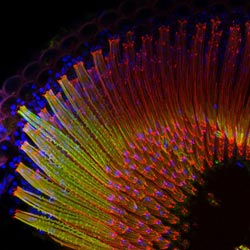

Karin Panser is a member of Andrew Straw’s group at the IMP Vienna. The team addresses the fundamental question of how the brain of a fruit fly functions. ‘We aim to understand how the fly processes complex visual input and translates that into a specific coordinated behavior’, Panser explains.
For her neuroscientific studies, she needs greatly enlarged, detailed pictures generated with a confocal microscope. To process and analyse her data, Panser uses the software ‘Huygens (SVI.NL)’.
As her contribution to the Huygens Image Contest 2013, Karin Panser submitted an image of ommatidia – single eyes of the fly that consist of several cells and are innervated by one axon each. Several hundred of these ommatidia form the compound eye of the fruit fly. The perfectly regular arrangement of the fly eye, together with the molecular staining contribute to the stunning beauty of the photograph which was awarded first prize by the jury.
Illustration
The winning picture can be downloaded in high resolution and may be printed free of charge: http://www.imp.ac.at/pressefoto-ommatidia
Caption
The image represents fruit fly (Drosophila melanogaster) ommatidia, which are arranged in an extremely regular array in the compound eye. Nuclei are shown in blue (DAPI), cadherin in red, and chaoptin in the photoreceptors in green. This Zeiss LSM780 confocal (NA 1.4/40x) image was deconvolved with Huygens Professional. Copyright: IMP
About the IMP
The Research Institute of Molecular Pathology (IMP) in Vienna is a basic biomedical research institute largely sponsored by Boehringer Ingelheim. With over 200 scientists from 35 nations, the IMP is committed to scientific discovery of fundamental molecular and cellular mechanisms underlying complex biological phenomena. Research areas include cell and molecular biology, neurobiology, disease mechanisms and computational biology.
Press Contact
Dr. Heidemarie Hurtl
IMP-Communications
Tel. +43 (0)1 79730-3625
mobil: +43 (0)664 8247910
E-mail: hurtl@imp.ac.at












